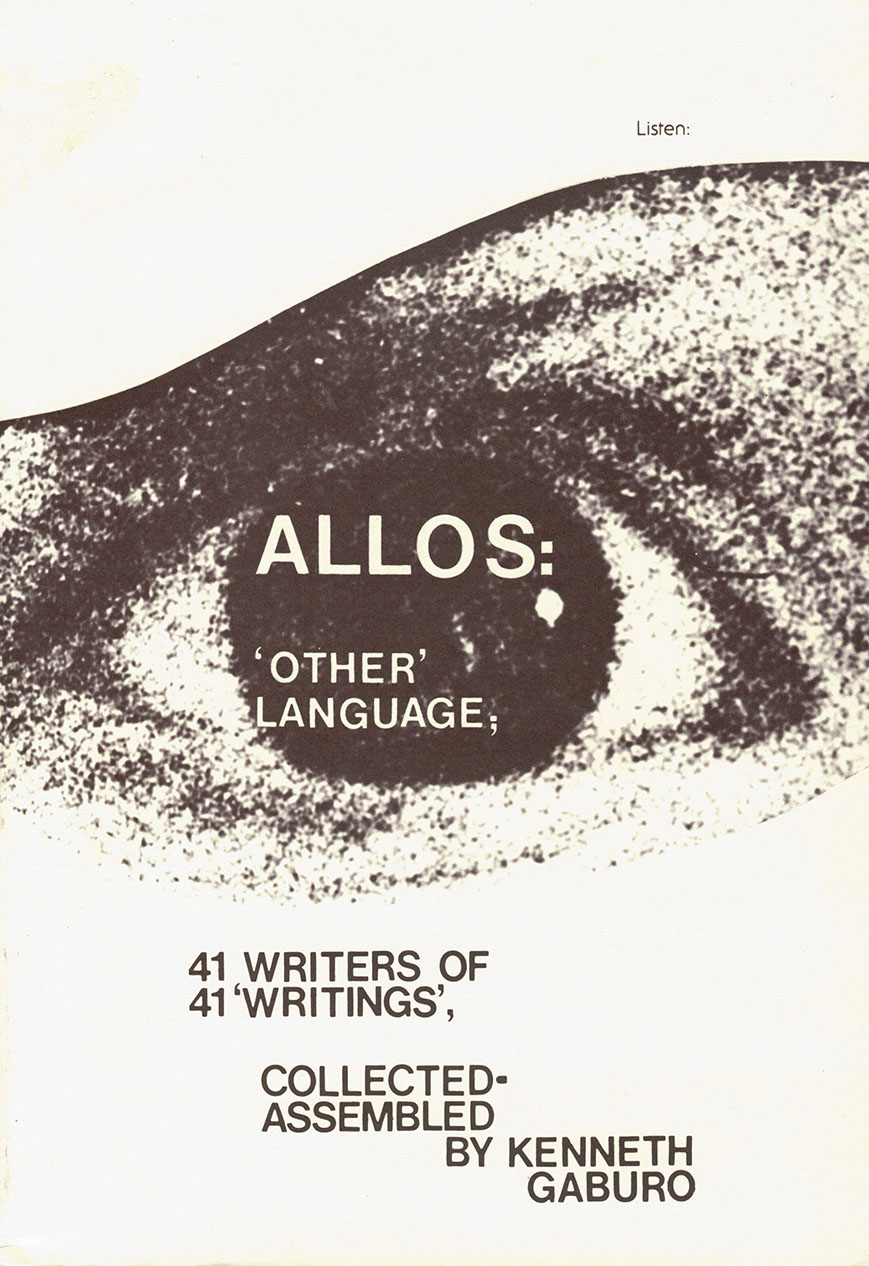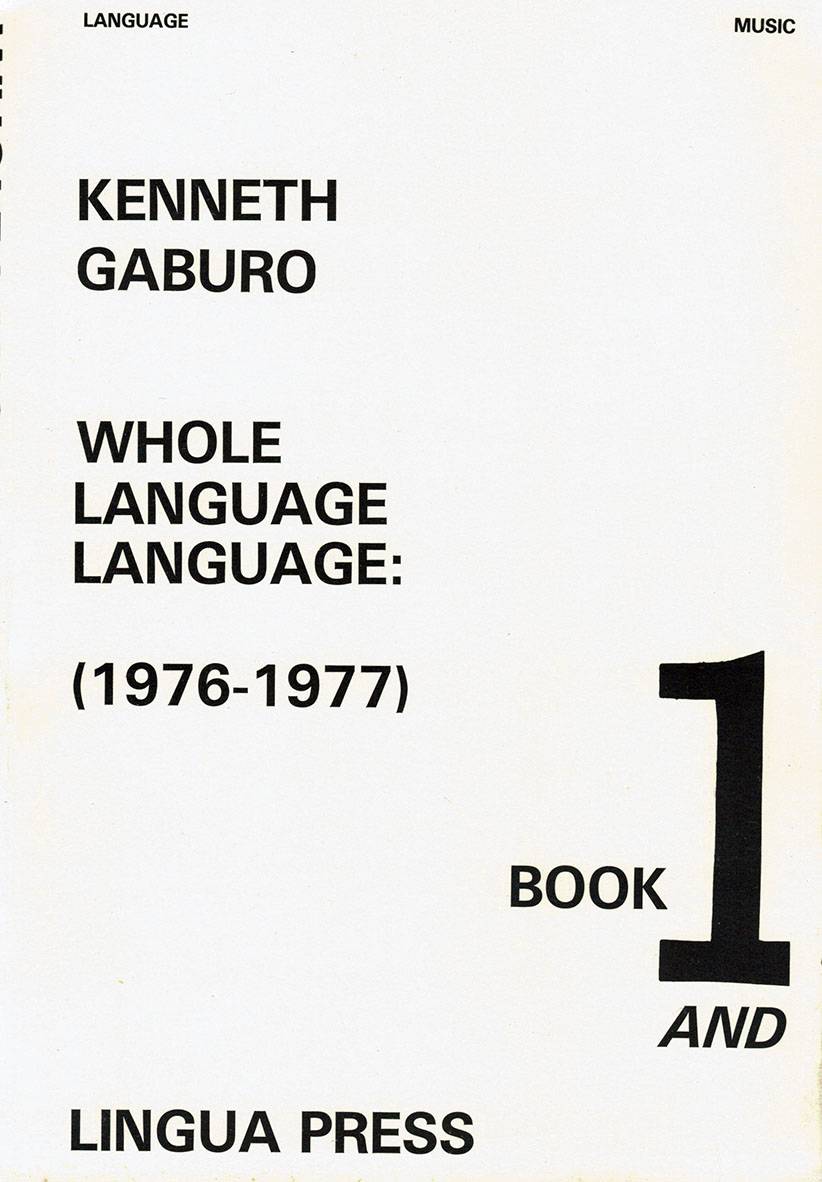Lingua Press
Lingua Press


The Flight of the Sparrow: Lingua 1 Poems and Other Theaters
A composition for one actor and tape, or two actors. Score. 1970
And more
![Cover of Dante's Joynte: Lingua 1. [Poems and Other Theaters]](https://rile.space/storage/744/dante.jpg)
Dante's Joynte: Lingua 1. [Poems and Other Theaters]
Kenneth Gaburo (1926-1993) is renowned as a teacher, pioneer of electronics in music, jazz pianist, writer, ecologist, publisher, and proponent of compositional linguistics. Over the course of a dedicated career, his uncompromising work carved out its own patch in the territory of American experimentalism.
Lingua Press, 1976

Privacy One : Words Without Song (1950-1974)
Kenneth Gaburo (1926-1993) is renowned as a teacher, pioneer of electronics in music, jazz pianist, writer, ecologist, publisher, and proponent of compositional linguistics. Over the course of a dedicated career, his uncompromising work carved out its own patch in the territory of American experimentalism.
Lingua Press, 1976

Allos : 'Other' Language
Gaburo collects and assembles 41 writers who explore such issues as aleatoric music, language, and poetry. Gaburo founded Lingua Press in 1975, taught at the University of Iowa, and is best known for his experimental musical compositions.

chris mann and grammar
A Lingua Press Bookplay, 1990
Introduction by Kenneth Gaburo,Herbert Brun, Annea Lockwood, David Dunn,John Cage.
Chris Mann (March 9, 1949 Australia–September 12, 2018 New York NY) was an Australian composer, poet and performer specializing in the emerging field of compositional linguistics, coined by Kenneth Gaburo and described by Mann as "the mechanism whereby you understand what I'm saying better than I do".[1] He was, in the last 2 decades of his life, based in New York City.
Mann studied Chinese and linguistics at the University of Melbourne, and his interest in language, systems, and philosophy is evident in his work. Mann founded the New Music Centre in 1972 and taught at the State College of Victoria in the mid-1970s. He then left teaching to work on research projects involving cultural ideas of information theory and has been recognized by UNESCO for his work in that field.[1]
Mann moved to New York in the 1980s and was an associate of American composers John Cage and Kenneth Gaburo. He performed text in collaboration with artists such as Thomas Buckner, David Dunn, Annea Lockwood, Larry Polansky, and Robert Rauschenberg.
Mann recorded with the ensemble Machine For Making Sense with Amanda Stewart, Rik Rue and others, Chris Mann and the Impediments (with two backup singers and Mann reading a text simultaneously while only being able to hear one another), and Chris Mann and The Use. His piece The Plato Songs, a collaboration with Holland Hopson and R. Luke DuBois, features realtime spectral analysis and parsing of the voice into multiple channels based on phonemes. Mann has also participated in the 60x60 project.[2]
Mann taught in the Media Studies Graduate program at The New School. He died in September 2018 after a recurrence of cancer. He is survived by his wife and two children.

Whole Language Language : (1976-1977)
Lingua Press, 1988
Gaburo was born in Somerville, New Jersey. He served as a professor of music at the University of Illinois, the University of California, San Diego, and the University of Iowa. His notable students include James Tenney and Allen Strange. He is renowned as a teacher, pioneer of electronics in music, jazz pianist, writer, ecologist, publisher, and proponent of compositional linguistics.
In 1968, he joined the faculty at the new San Diego campus of the University of California where in 1972 a Rockefeller Foundation grant enabled him to start NMCE IV, this time with an actor, a virtuoso speaker, a mime, a gymnast, and a sound-movement artist (Rosen and Moore 2001). Until his resignation from UCSD in 1975 he produced a large number of integrated theatrical works, such as the collection Lingua and Privacy.
In 1975, Gaburo founded Lingua Press, which produces scores, books, records, audio tapes, videotapes, and films (Rosen and Moore 2001). This firm is dedicated to putting forth unique artist-produced works in all media having to do with language and music. Many of the publications have been exhibited in book art shows throughout the world. Gaburo lived in the Anzo-Borrego desert writing and teaching from 1980 until 1983. In 1980, he was artistic director for the first "authentic" production of Harry Partch's The Bewitched for the Berlin Festival (recorded on Enclosure Five: Harry Partch, innova 405). His understanding of Partch's concept of corporeality has deep connections with his own concern for physicality and how it informs compositions. His 1982 tape work, RE-RUN, for instance, was generated after a 20-hour sensory deprivation exercise.
He became Director of the Experimental Music Studio at the University of Iowa in 1983. The studio put intensive focus on composition, technology, psycho-acoustic perception, performance, and the affirmation of the uniqueness of the individual to create his/her own language reality. At the studio, he founded the Seminar for Cognitive Studies, a forum for discussion of the creative process. His concern for the investigation of music as legitimate research, and composition as the creation of intrinsic appropriate language, led to a series of readings in compositional linguistics for solo performer.
He most often made innovative use of electronics and explored tonality, serialism, and what he called "compositional linguistics" such as in his LINGUA series (Listening). He also wrote minimal pieces such as The Flow of (u) for three voices singing unison.
Gaburo died in 1993 in Iowa City, Iowa.
The archive of his life's work is held at the University of Illinois Music Library.
